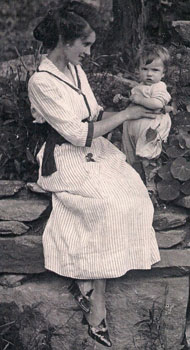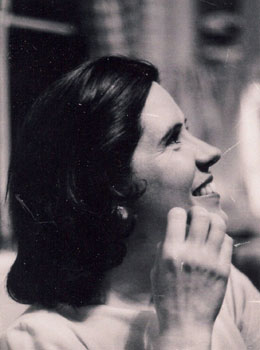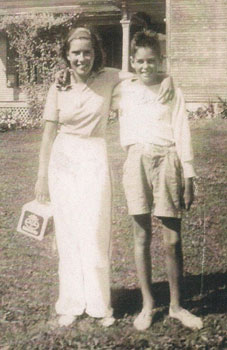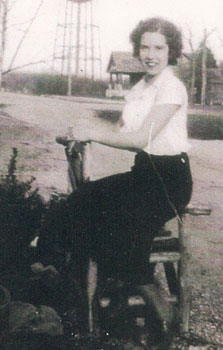|
Chapter XIII
At a time just before the Great Depression in 1931,
Agnes was living with the two children, Shane and Oona in The Old House
in West Point Pleasant, New Jersey. My mother Budgie, Nanna, little
Robert and I were living in the Merryall house, north of New Milford,
Connecticut. Robert was Margery's second child and born in July 1930.
My earliest memories of the Merryall house were when I
was about four years old. Set back from a dirt road and edged with
several huge old maple trees, the two-story Colonial was painted a soft
barn red, with a side porch facing the valley below the New Milford
hills and looking down on the Aspetuck River.
The peach tree in the side yard was the largest one in
the whole world, with more peaches hanging from its branches than anyone
could imagine. So we believed. Inside the old house, a large living room
boasted a great stone fireplace around which the family had tea each day
in the late afternoon. It was here, in this beloved old house, where my
family and I spent our summers.
Six months before Robert's birth, Margery married Louis
Colman, who became a father to us both. I loved him dearly, but after
about a year and a half he left and went away to New York City. It broke
my heart! Budgie told me later, when I was grown, that she wanted to
raise her children alone because she wanted sole control over how they
were to be raised. For all my mother’s wild youth, she was very rigid in
her ways during our childhood, mellowing greatly in her later years.
Only a baby, Robert was not good company for me at age
four, and most of the other people around were grown-ups. So I had to
entertain myself with the attention of friends and relatives who came to
visit. My very favorite was Marnie, my mother’s Aunt Margery. We
pronounced her name "Mahnie," the English way. (Many years later I named
my first child Marnie.) I also loved to see Marnie’s husband, Uncle
Francesco Bianco. He wrote poetry and had a bookstore near Washington
Square in New York City. In the summers they left the city and came up
to Merryall to stay in their charming storybook house up the hill from
us on Frenchman's Road.
Aunt Marnie was tall and thin, with her hair done in
what was called a Dutch boy coiffure. We called it simply “a bob!”
Marnie had a gentle, caring way about her and seemed to see all through
kind eyes. She delighted us with her wonderful wit, enhanced by the
British accent she managed to retain through all her years. I adored
her. Uncle Francesco was a small kindly man with graying reddish hair,
and his light blue eyes crinkled up at the corners when he told his
wonderfully funny stories.
We would often all troop up the hill to visit the
Biancos in their comfortable little home. The gray painted cottage wore
solid light blue shutters with quarter moons cut into them. On the side
of the house there was a huge wooden rain cistern where the rainwater
was collected for washing. We had to push open the small gate as we went
into the yard and Aunt Marnie and Uncle Francesco would call a cheery
greeting from the house, “Come in! Come in!”
Aunt Marnie some days found interesting things for us to
do, and often told us stories about animals she had known, such as a
baby alligator she kept warm on cold nights by wrapping him in a piece
of flannel and taking him into bed with her, or the cat who insisted on
finding mice for my brother and me whenever we cried.
We loved her stories and her story books. One day Aunt
Marnie took us for a walk in the woods behind her house. Running
alongside on his short little legs, her small black dog named Scottie
went with us. This time we found an ant hill about two feet high, the
likes of which I have never seen since. We stood amazed, watching the
ants climbing up and down the hill. Scottie wanted to explore the
mountain and tried digging into it with his fast little paws. Marnie
distracted him with a stick to chase.
On the way back to the cottage, Marnie told us we would
find Uncle Francesco making spaghetti. It was intriguing to see him
cutting rolls of dough into thin strips and then hanging them over a rod
to dry. By dinner time he would have made a delicious sauce with
tomatoes and vegetables from the garden, and also baked a loaf of thick,
crusty bread. The smells of all the good food were overwhelming, and we
were delighted to be invited to stay for dinner. Marnie was very proud
of her garden and told us the names of the various vegetables and the
glorious flowers. These were special memories to tuck away for later
years.
In those early days, Barbara spent several summers with
us. We missed her so much in the two winters when she had to go away to
boarding school. Her mother, our Aunt Aggie, was very busy with travels
and writing and needed help with Cookie’s care.
 |
 |
| Young Agnes
with baby Barbara Burton, circa 1914-1915. |
Barbara
Burton Davis, 1935.
(She added the name Davis in NY.) |
I recall one summer when Barbara was about seventeen and
staying with us, she came down with pneumonia. There was an air of worry
as Nanna nursed her back to health and I remember her looking so pale
and fragile lying on the large bed in the upstairs North Room. I was
afraid she might die. She seemed like an adult because I was thirteen
years younger. She was sweet and gentle and the family loved her. As I
remember her in those days, she was very beautiful with large, wide-set
dark brown eyes and a lovely smile. We needed to be as quiet as possible
so Barbara could rest and be well again. Nanna wrote to Aggie telling
her Dr. Stevens came to see Barbara and ordered lots of fluids. In time,
her fever came down and she recovered slowly. It was good to see her up
and about once more as her energy returned.
Barbara told me later of the time when she stayed with
us all one winter and went to school in New Preston, and how the other
children teased her and threw cow manure at her because she was a “city
girl.” It was painful for her, but she was very philosophical about it.
Barbara had learned to hide her hurts well.
 |
 |
| Barbara and
Shane, 1920. |
Barbara
Burton, 1932. |
As I recall the Merryall summers, I think of lines from
a favorite song called “The Old Oaken Bucket” that Nanna sang as she
played the piano. “How dear to this heart are the scenes of my
childhood...” For me at age five, Merryall and the scenes of my
childhood became a wonderful children’s world. The second summer I
remember was filled with good times, cousins coming to visit and the
usual grown-ups who came and went. We picked and ate rosy-ripe peaches,
watched the little goats in the shed down the hill, walked through the
high wild grasses that grew far behind the house and down to the river
below, and we played children’s games.
Oona came to stay with us that summer when she was
seven. Two years older and a little taller than I, she was like my big
sister. Nanna told her that the warm, dark tan she had acquired made her
look “as brown as a berry.” Oona had a crown of thick brown hair, intent
wide-set eyes like Barbara's, and a winning smile. She cast a spell over
me in those early years and I agreed to do whatever she told me.
One sunny afternoon, Oona had an idea. There was a large
stone wall around the well in our front yard, and the water bucket hung
from a sturdy ring attached to a rope for hauling up our drinking water.
When Budgie and Nanna were indoors, Oona suggested,
“Let’s put our dolls in the bucket by the well. We can send them down
into the water to have a bath.” It sounded like a fun idea to me, so we
proceeded to do just that, cranking the handle that lowered the bucket
and the dolls down into the well. After a splash sounded, we knew the
dolls had gone into the water. Oona cranked them up again. Our babies
were drenched!
It took days for the cloth bodies of the dolls to dry
out, and as they lay in the sun their composition faces became awfully
cracked. So much for doll baths in the well. We also had a “talking to”
from Nanna, but she took pity on us as we nursed them tenderly until
they were thoroughly dry. They were definitely not so smooth anymore.
“Let’s make believe they have a dreadful disease,” Oona
suggested, and we amused ourselves with that idea for awhile. I found my
doll in an old treasure trunk years later, but she had never recovered
from her dunking!
The old house still stands in Merryall, and sometimes as I drove by
many, many years later, I liked to think of the happy times we spent in
that magic place, with all the family, including Oona, Robert, the
Woodville cousins and our beloved adult friends who paid us so much
attention.
Our winters had been spent in the studio-bungalow, which
my grandfather Teddy had owned in Woodville. There was a hand pump in
the kitchen for water, a kerosene lamp on our table, the large tin tub
for baths, and a wood stove for heat. Our toilet was outdoors and called
the “back-house” or the “out-house.” It was during the Great Depression
and we grew an enormous garden; at least it seemed enormous when the
family weeded it each week. After a harvest in the autumn, Nanna and my
mother stored beets and carrots in barrels of sand in the cellar and put
up many jars of fruits
and vegetables.
Mother bought a small red and white cow we named Daisy
and she learned to milk her. She told me years later not ever to tie
myself down learning to milk a cow! We had chickens, which my
grandmother tended and sometimes killed so we might have a chicken
dinner. I refused to eat them. I knew what had happened to them when I
heard them screaming as Nanna chased them to end their days on the
chopping block.
Nanna made hooked rugs and sold them so we were able to
buy large mail-order sacks of flour and grains for breakfast cereal and
bread. Mother drove us down in great style to the New Preston train
depot to pick up those bulky supplies. She had an old eight-passenger
navy blue Buick convertible, with running boards on each side, and
Robert and I were allowed to sit in the small pull-up seats in the back.
Aunt Bobby and Uncle Walter lived up the hill in a
handsome cream-colored Colonial farmhouse surrounded with great maple,
oak and horse chestnut trees. The huge old horse chestnuts were our
favorites because they dropped satin-skinned nuts down for us to use in
all kinds of games. The small red barn down across the field, housed one
cow for milk and several horses for riding. The barn extension held
many chickens and a feisty rooster, while cats and dogs joined the
outdoor scene and followed us all around. Oona, and sometimes Shane,
would come up to visit and were warmly included in this family with six
children, and my brother and me.
We shared summer swims in a favorite place. Barefoot,
we’d hike up the dirt road and down a grassy path to the wide, cool
brook, where a high waterfall pouring down on us was the most fun of
all.
As children we didn’t really feel the impact of the
depression, but I do remember my Uncle Walter sitting on the running
board of his car and weeping, with his head in his hands, because there
was no work for him anywhere. I was very touched by his distress,
realizing in a child’s way how serious it was. I have never forgotten
the feelings.
 Chapter XIV
Chapter XIV |